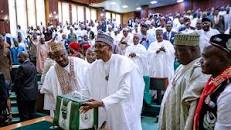President Muhammadu Buhari has requested the National Assembly to approve $4,054,476,863 and €710 million external loans for funding ongoing critical projects and other expenditures of government.
This is even as the Executive is also seeking the legislature’s approval for grant components of $125 million in the 2018-2020 as part of the 2018-2020 external rolling borrowing plan.
Buhari conveyed the requests in a letter addressed to both chambers of the National Assembly and read on the floor at the resumption of plenary sessions at the green and red chambers
The President’s letter reads in part: “I write on the above subject and submit the attached addendum to the proposed 2018-2020 external rolling borrowing plan for the consideration and concurrent approval of the senate for the same to become effective.
“The distinguished Senate President may recall that I submitted a request on 2018-2020 borrowing plan for the approval of the senate in May 2021.
“However, in view of other emerging needs and to ensure that all critical projects approved by Federal Executive Council as of June 2021 are incorporated, I hereby forward an addendum to the proposed borrowing plan.
“The projects listed in the external borrowing plan are to be financed through sovereign loans from the World Bank, French Development Agency, EXIM Bank and IFAD in the total sum of $4,054,476,863 and €710 million and grant components of $125 million”, Buhari added
Although experts have continued to express concerns about Nigeria’s borrowing in recent years and the sustainability, the Minister of Finance, Budget and National Planning, Dr. Zainab Ahmed; the Director General of the Debt Management Office (DMO), Patience Oniha and other top officials of government have maintained that the nation’s debt to GDP ratio remains within the threshold of globally accepted level.
Ahmed, had at a public forum late August this year said: “We are borrowing sensibly and we are investing in rail and other infrastructure; If we do not do these investments, we will regret. These investments will return revenue in the future.”
Earlier in May, the the DMO Director-General, had said during a presentation on Nigeria’s local and foreign debt management at the West African Region – Debt Advocacy and Training Sessions in Abuja, organised by the African Network on Environment and Economic Justice (ANEEJ) in partnership with African Forum and Network on Debt and Development (AFRODAD) that Nigeria was not over-burdened by her borrowing.
Represented at the forum by Monday Usiade, the nation’s chief debt management officer, Oniha said the DMO office had set a debt specific limit of 40 per cent even though the World Bank and the IMF advised Nigeria could raise the limit to 55 per cent.
The DMO chief said: “We have said we will always ensure responsible borrowing, even at the 40 per cent threshold, Nigeria is still at 21 per cent, which is relatively low. Looking at all the indicators, Nigeria is not under any debt distress.”






